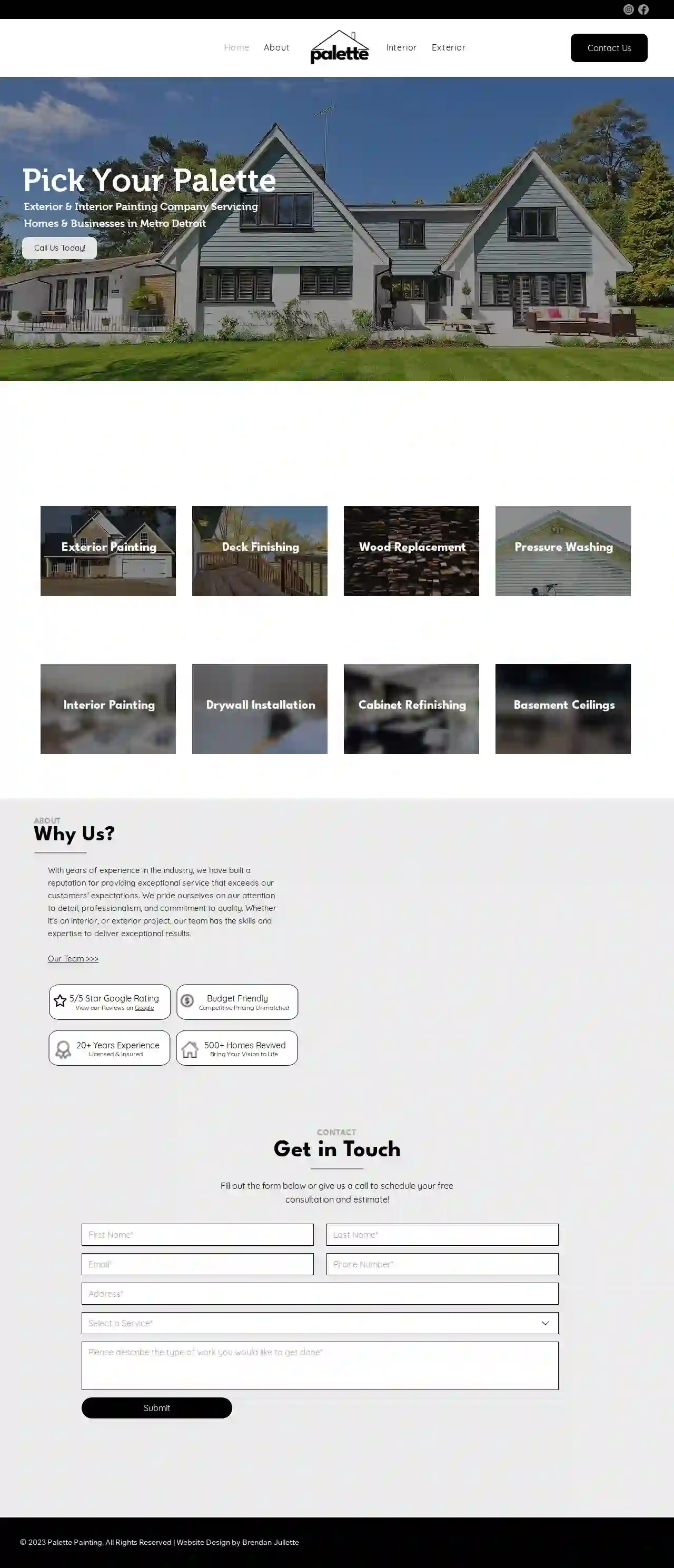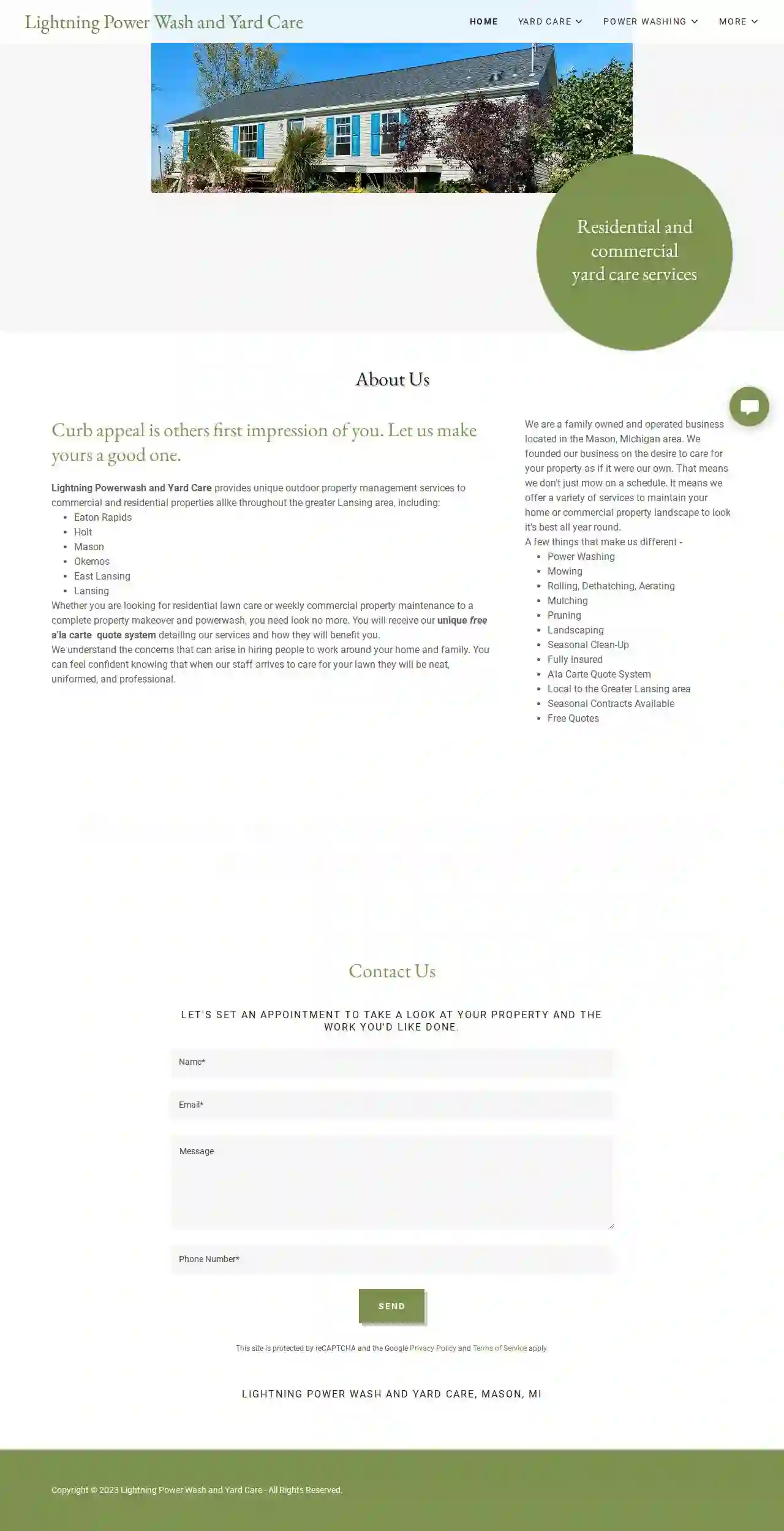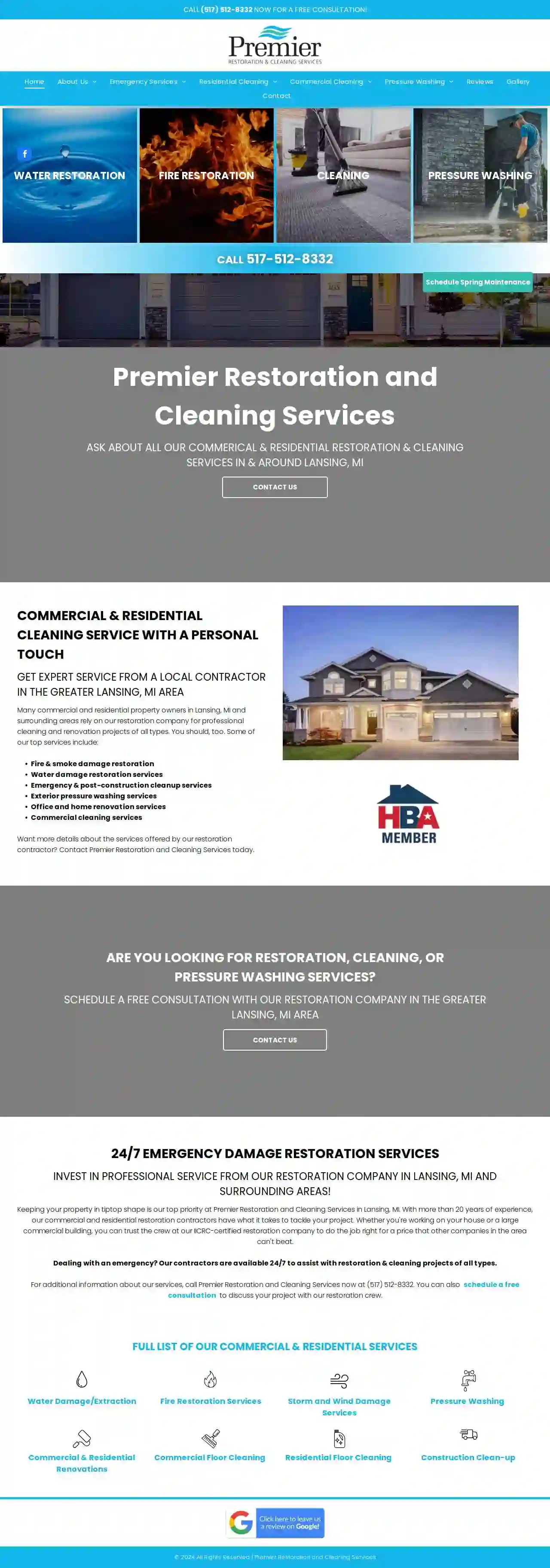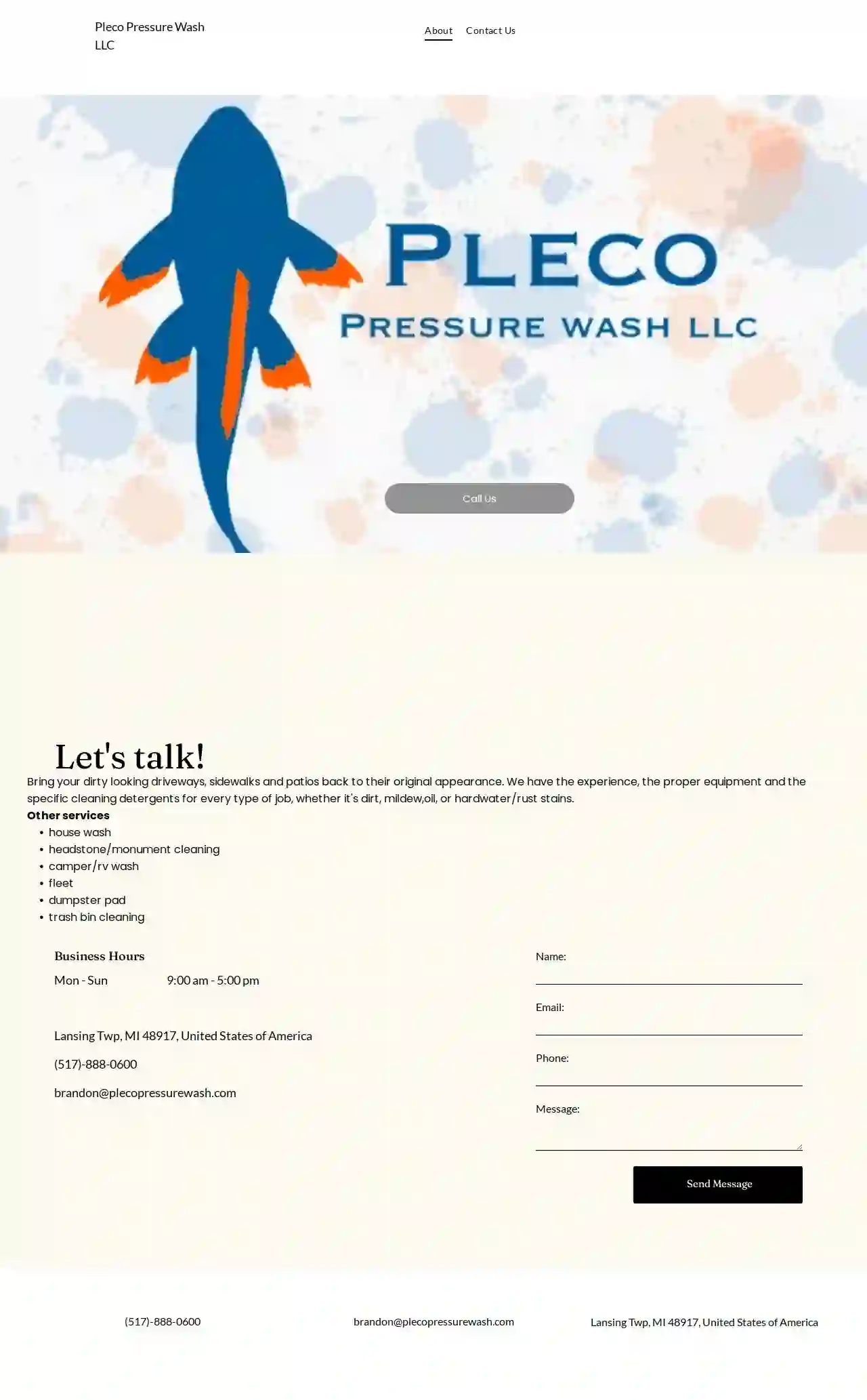Pressure Washing Ionia
Find the best Driveway Cleaning in Ionia
Get multiple Commercial Pressure Washing quotes for your project today! Compare profiles, reviews, accreditations, portfolio, etc... and choose the best service.

ProClean Power Washing Lansing
516 reviewsLansing, MI, 1229 N Capitol Ave, 48906, USProClean Power Washing Lansing is a professional power washing company serving the Lansing, MI area. We offer a range of services including residential and commercial power washing, exterior house cleaning, patio and deck cleaning, driveway and sidewalk cleaning, and roof cleaning. Our team is dedicated to providing top-notch service and ensuring customer satisfaction. With over 20 years of experience, we have built a reputation for being one of the best power washing companies in the area. We use our cutting-edge soft wash technology to blast away dirt and debris while being ultra-careful to protect the integrity of your siding, brick, or other exterior surfaces. Our commitment to quality and customer satisfaction has earned us a 5-star rating and numerous positive reviews. Contact us today to schedule your power washing service and experience the ProClean difference.
- Services
- Why Us?
- Accreditations
- Our Team
- Testimonials
- Gallery
Get Quote
ProClean Power Washing Ann Arbor
4.931 reviewsAnn Arbor, MI, USA, 1327 Jones Drive Suite 106, 48105, USProClean Power Washing Ann Arbor is a professional and reliable exterior pressure washing service provider in Ann Arbor, MI, and southern Michigan. With 20 years of experience, they are committed to keeping the community safe with sanitization and disinfection services. Their team uses a cutting-edge 'Soft Wash' method that gently yet effectively removes stains without damaging surfaces. They pride themselves on fast, reliable, and trusted services, aiming for 100% customer satisfaction.
- Services
- Why Us?
- Gallery
Get Quote
Little Dog Power Washing
512 reviews123 Main St, Suite 100, Plymouth, 48170, USLittle Dog Power Washing is a licensed and insured pressure washing company based in Metro-Detroit. They specialize in power washing, soft washing, and pressure washing services for residential and commercial properties. Their services include house washing, roof washing, driveway and walkway cleaning, gutter cleaning, deck washing, and more. They have been voted the #1 Power-Washing/Soft-Washing Co. in customer relations for three years running and are known for their focus on safety, professional equipment, and full training of their teams.
- Services
- Why Us?
- Accreditations
- Our Team
- Testimonials
- Gallery
Get Quote
Ever Clean Pressure Washing LLC
4.127 reviewsGarden City, MI, 48135, USEver Clean Pressure Washing is a locally owned and operated pressure washing contractor operating out of Garden City, MI. We offer a variety of residential and commercial cleaning services including low pressure house washing, roof cleaning, deck restoration, and much, much more. We are dedicated to delivering professional cleaning and friendly customer care for an exceptional customer experience. Contact Ever Clean Pressure Washing if you have any questions about our cleaning services, need more information, or want to schedule your next cleaning project. Contact us today for a free estimate. We look forward to working with you!
- Services
- Why Us?
- Testimonials
- Gallery
Get Quote
Palette Painting
513 reviewsSuite 456, 123 Main St, Farmington Hills, 48075, USPalette Painting LLC is a reputable exterior and interior painting company that has been serving homes and businesses in Metro Detroit for over 20 years. They offer a range of services including exterior painting, deck finishing, wood replacement, pressure washing, interior painting, cabinet refinishing, basement ceilings, and drywall installation. Their team is skilled, professional, and committed to delivering exceptional results. They have a 5/5 star Google rating and pride themselves on their attention to detail and competitive pricing.
- Services
- Why Us?
- Accreditations
- Our Team
- Testimonials
- Gallery
Get Quote
Rise N’ Shine Pro Services LLC
4.421 reviews8025 Folks Rd, Hanover, 49241, USRise N’ Shine Pro Services is a licensed and insured maintenance business that takes pride in our work & customer satisfaction. We have over 10 years in business serving south central Michigan. We offer pressure washing, painting and staining services. Satisfaction Guarantee We take pride in our work and the services we provide. Our work is only done when our customers are satisfied. We work tirelessly to ensure we offer only the best to our customers. Quick Response Have a job you need done right away? Rise N Shine is dedicated to quickly servicing the needs of our customers, no matter the job. Trusted Experience Rise N Shine has over 10 years experience. We have earned the trust of thousands of customers throughout South Central Michigan. We have the experience your project deserves.
- Services
- Why Us?
- Gallery
Get Quote
Moeh Services
534 reviewsAnn Arbor, USMOEH SERVICES is a professional cleaning company that offers a range of services to both commercial and residential customers in the Metro-Detroit area. Our mission is to guarantee customer satisfaction and earn more great reviews. We are insured and certified, and our team of friendly professionals is dedicated to providing top-notch cleaning services. With a focus on customer satisfaction, we ensure that every job meets our high standards. We offer a variety of services, including power washing, window washing, deck staining, paver sand and seal, gutter cleaning, interior window washing, Christmas lights, concrete clean and seal, rust and efflourence removal, graffiti removal, and roof washing. We also offer commercial services to help businesses maintain a clean and welcoming environment. Our team is committed to providing exceptional service and ensuring that our customers are completely satisfied with our work.
- Services
- Why Us?
- Gallery
Get Quote
Lightning Powerwashing & Yard Care
53 reviews1111 S. Lansing Ave., Mason, 48854, USResidential and commercial yard care services Curb appeal is others first impression of you. Let us make yours a good one. Lightning Powerwash and Yard Care provides unique outdoor property management services to commercial and residential properties alike throughout the greater Lansing area, including: Eaton Rapids Holt Mason Okemos East Lansing Lansing Whether you are looking for residential lawn care or weekly commercial property maintenance to a complete property makeover and powerwash, you need look no more. You will receive our unique free a'la carte quote system detailing our services and how they will benefit you. We understand the concerns that can arise in hiring people to work around your home and family. You can feel confident knowing that when our staff arrives to care for your lawn they will be neat, uniformed, and professional. We are a family owned and operated business located in the Mason, Michigan area. We founded our business on the desire to care for your property as if it were our own. That means we don't just mow on a schedule. It means we offer a variety of services to maintain your home or commercial property landscape to look it's best all year round. A few things that make us different Power Washing Mowing Rolling, Dethatching, Aerating Mulching Pruning Landscaping Seasonal Clean-Up Fully insured A'la Carte Quote System Local to the Greater Lansing area Seasonal Contracts Available Free Quotes "If you look the right way you can see that the whole world is a garden." Francis Hodges Burnett
- Services
- Why Us?
Get Quote
Premier Restoration and Cleaning Services
4.720 reviews123 Main St, Suite 100, Lansing, 48906, USPremier Restoration and Cleaning Services is a comprehensive restoration company based in Lansing, MI, offering a wide range of services including water damage remediation, fire damage restoration, wind damage repair, and more. They also provide cleaning services such as carpet cleaning, upholstery cleaning, and tile & grout cleaning, as well as pressure washing and renovation services for kitchens and bathrooms. Their team is highly trained and certified, ensuring exceptional results and a commitment to quality.
- Services
- Why Us?
- Accreditations
- Our Team
- Testimonials
- Gallery
Get Quote
Pleco Pressure Wash LLC
Lansing Twp, MI, Lansing, 48917, USPleco Pressure Wash LLC is your local solution for bringing back the beauty of your outdoor spaces. We specialize in cleaning driveways, sidewalks, patios, and more, removing dirt, mildew, oil, hard water stains, and rust. With our experience, specialized equipment, and effective cleaning detergents, we tackle every job with precision and care. Beyond standard pressure washing, we offer a range of services to meet your unique needs: House Washing Headstone/Monument Cleaning Camper/RV Wash Fleet Washing Dumpster Pad Cleaning Trash Bin Cleaning Contact us today for a free estimate and let us restore your property to its former glory!
- Services
- Why Us?
- Our Team
- Gallery
Get Quote
Over 60,241+ Janitorial Contractors in our network
Our cleaning pros operate in Ionia & surroundings!
CleaningMatch has curated and vetted the Best Cleaning Contractors arround Ionia. Find a reliable contractor today.
Frequently Asked Questions About Pressure Washing
- Experience and Expertise: Professionals have the knowledge and skills to choose the right pressure levels and cleaning solutions for different surfaces, minimizing the risk of damage.
- Professional Equipment: Pressure washing companies use commercial-grade equipment that is more powerful and efficient than consumer-grade pressure washers.
- Safety: Pressure washing can be hazardous, especially when working on ladders or with high-pressure water. Professionals are trained in safety procedures and have the necessary equipment to work safely.
- Time-Saving: Pressure washing can be time-consuming, especially for larger projects. Hiring professionals frees up your time for other tasks.
- Pressure Washing: For hard surfaces like concrete, brick, or decks, pressure washing can effectively remove mold and mildew. Use a cleaning solution containing bleach or mildewcide for optimal results.
- Soft Washing: For delicate surfaces like roofs or siding, soft washing is the preferred method for mold and mildew removal. Soft washing uses low-pressure water and specialized cleaning solutions to gently remove mold and mildew without damaging the surface.
- Prevention: After cleaning, take steps to prevent future mold and mildew growth by addressing moisture issues, such as fixing leaks, improving ventilation, and trimming vegetation that creates shade and traps moisture.
- Regular Cleaning: Sweep or rinse surfaces regularly to prevent dirt and grime from building up.
- Address Stains Promptly: Clean up spills or stains as soon as possible to prevent them from setting in.
- Trim Vegetation: Keep trees and shrubs trimmed away from surfaces to minimize shade, which can promote mold and mildew growth.
- Apply Protective Coatings: Consider applying protective sealants or coatings to surfaces like decks or fences to repel water and dirt, extending their lifespan and maintaining their appearance.
- Schedule Periodic Pressure Washing: Schedule periodic professional pressure washing to maintain the cleanliness and appearance of your surfaces over time.
- Spring and Fall: Spring and fall are often ideal for pressure washing as the temperatures are moderate and the weather is typically dry.
- Summer: Pressure washing can be done in the summer, but avoid doing so during the hottest part of the day to prevent the cleaning solutions from drying too quickly and leaving streaks.
- Winter: Pressure washing is possible in the winter, but be mindful of freezing temperatures that can affect cleaning solutions and cause slippery surfaces.
Can I pressure wash my own house?
If you're considering DIY pressure washing, assess the complexity of the project, your experience, and the risks involved. For larger or more challenging projects, hiring professionals is often a wiser and safer choice.
Can pressure washing remove mold and mildew?
If you have extensive or persistent mold and mildew problems, consult with a professional pressure washing company or a mold remediation specialist.
What are some tips for maintaining my pressure washed surfaces?
By implementing these maintenance practices, you can prolong the results of your pressure washing and keep your surfaces looking their best.
What is the best time of year for pressure washing?
Choose a day with mild temperatures and dry weather for optimal pressure washing results. Avoid pressure washing in extreme heat, freezing temperatures, or rainy conditions.
Can I pressure wash my own house?
- Experience and Expertise: Professionals have the knowledge and skills to choose the right pressure levels and cleaning solutions for different surfaces, minimizing the risk of damage.
- Professional Equipment: Pressure washing companies use commercial-grade equipment that is more powerful and efficient than consumer-grade pressure washers.
- Safety: Pressure washing can be hazardous, especially when working on ladders or with high-pressure water. Professionals are trained in safety procedures and have the necessary equipment to work safely.
- Time-Saving: Pressure washing can be time-consuming, especially for larger projects. Hiring professionals frees up your time for other tasks.
If you're considering DIY pressure washing, assess the complexity of the project, your experience, and the risks involved. For larger or more challenging projects, hiring professionals is often a wiser and safer choice.
Can pressure washing remove mold and mildew?
- Pressure Washing: For hard surfaces like concrete, brick, or decks, pressure washing can effectively remove mold and mildew. Use a cleaning solution containing bleach or mildewcide for optimal results.
- Soft Washing: For delicate surfaces like roofs or siding, soft washing is the preferred method for mold and mildew removal. Soft washing uses low-pressure water and specialized cleaning solutions to gently remove mold and mildew without damaging the surface.
- Prevention: After cleaning, take steps to prevent future mold and mildew growth by addressing moisture issues, such as fixing leaks, improving ventilation, and trimming vegetation that creates shade and traps moisture.
If you have extensive or persistent mold and mildew problems, consult with a professional pressure washing company or a mold remediation specialist.
What are some tips for maintaining my pressure washed surfaces?
- Regular Cleaning: Sweep or rinse surfaces regularly to prevent dirt and grime from building up.
- Address Stains Promptly: Clean up spills or stains as soon as possible to prevent them from setting in.
- Trim Vegetation: Keep trees and shrubs trimmed away from surfaces to minimize shade, which can promote mold and mildew growth.
- Apply Protective Coatings: Consider applying protective sealants or coatings to surfaces like decks or fences to repel water and dirt, extending their lifespan and maintaining their appearance.
- Schedule Periodic Pressure Washing: Schedule periodic professional pressure washing to maintain the cleanliness and appearance of your surfaces over time.
By implementing these maintenance practices, you can prolong the results of your pressure washing and keep your surfaces looking their best.
What is the best time of year for pressure washing?
- Spring and Fall: Spring and fall are often ideal for pressure washing as the temperatures are moderate and the weather is typically dry.
- Summer: Pressure washing can be done in the summer, but avoid doing so during the hottest part of the day to prevent the cleaning solutions from drying too quickly and leaving streaks.
- Winter: Pressure washing is possible in the winter, but be mindful of freezing temperatures that can affect cleaning solutions and cause slippery surfaces.
Choose a day with mild temperatures and dry weather for optimal pressure washing results. Avoid pressure washing in extreme heat, freezing temperatures, or rainy conditions.